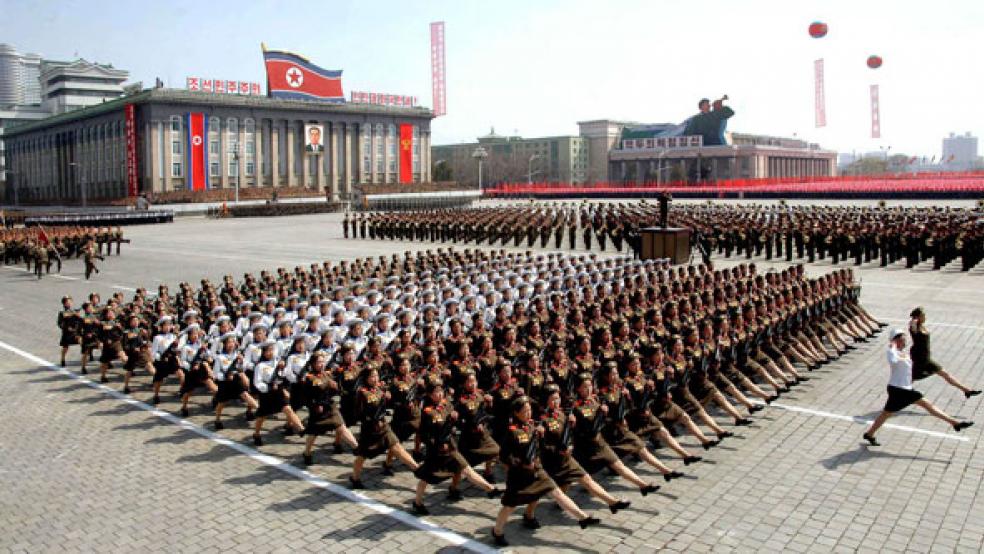North Korea cut its last remaining ties with South Korea on Monday, withdrawing 53,000 workers from the Kaesong Industrial Park that was run in cooperation with its southern neighbors.

The decision to stop operations at the plant is the latest in a string of actions taken by North Korea’s young, untested leader, Kim Jong-Un. He’s conducted a nuclear test and is thought to be on the verge of another; he’s threatened the nuclear annihilation of the United States and has ignored the pleas of patience from his key ally, China.
But the shutdown of the industrial plant is possibly more drastic than any of these other actions. Cho Dong-ho, a North Korea expert at Ewha Woman’s University in Seoul, called the plant a “string that links the two Koreas.” But more importantly to North Korean leadership, the plant provides the regime with one of its only streams of revenue.
“For North Korea, it is a cash cow,” Stephen Haggard, an expert on the country, wrote last year. “Since 2004, total wage payments for North Korean workers in the KIC have totaled $245.7 million, rising from $380,000 in 2004 (the first year of operation) to $61.76 million in 2011 and $45.93 million in the first half of 2012.”
In fact, the South Korean businesses involved in the project pay the North Korean government directly. No one knows how much North Korean workers ultimately receive, but by all indications it’s not much: North Korean per capita GDP is $1,800 per year, making it one of the poorest countries in the world.
North Korea’s ability to present a threat to the United States and its allies is due in part to the country’s military spending – $10 billion or about 25 percent of total GDP. It has the fifth largest military in the world.
But one shouldn’t confuse size for strength. According to Patrick Cronin, senior advisor and senior director of the Asia Program at the Center for New American Security, North Korea could not win a conventional war. Nuclear weapons are the only reason the world takes Un seriously.
But nukes are expensive to develop. North Korea was able to produce them only with assistance from other countries, and on the backs of its own people, who starved. As the Korean peninsula stands on the brink of war, North Korea illustrates how even the poorest nation can become a threat to American interests.
GUNS, NOT BUTTER
The country is notoriously secretive, but a few details about its economy are known. Beyond Kaesong, it operates plants with the Russians and the Chinese.
Outside of these industrial parks, North Korea’s economy barely exists. Propaganda released by the North claims that the government provides jobs for all of its 24 million citizens who are able to work, but that claim has been disputed by the few who have visited.
Most experts believe the majority of North Koreans live by subsistence farming. According to one recent visitor, aconsumer class is emerging, although it’s not clear how big this class is. And while steep economic sanctions forbid high-tech consumer goods from entering the country, mobile phones and computers are reportedly becoming more popular. Un was recently photographed using a Mac computer, which many experts believe came from China.
The country, however, is vulnerable to famine – one in the 1990s took the lives of hundreds of thousands of North Koreans – and it relies on foreign aid to feed its citizens.
GOING NUCLEAR
North Korea acquired nuclear weapons technology from AQ Kahn, the father of the Pakistani nuclear program. Former North Korean leader Kin Jong-Il is reported to have paid $3 million for the technology in the 1990s.
Since then, the United States and its allies have attempted to engage North Korea in negotiations to end the program. These talks have yielded little, except for the steep economic sanctions imposed by the United Nations.
China and Russia are the country’s only allies, but even Beijing has urged North Korea to tone down the rhetoric. (It’s important to note that North Korea has never fired a nuclear missile: It has only conducted nuclear tests. It’s not clear whether the country has the ability to mount a nuclear weapon onto a missile, although it does have weapons capable of transporting a nuke).
According to Cronin of the Asia Program at the Center for New American Security, Un is using increasingly inflammatory rhetoric to show his strength to the Korean people. Cronin said the North Korea military knows they cannot win a conventional war – so the only way to get the attention of the international community is through nuclear threats.
“If Kim Jong-Un wants to have a nuclear weapons state … he can’t let these sanctions go unchecked,” Cronin told The Fiscal Times recently. “We’re still in a state of rising provocation.”





